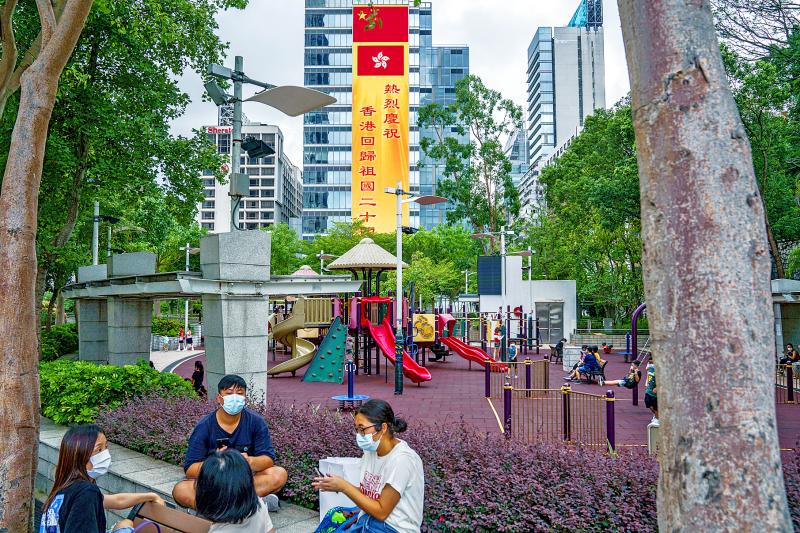Hong Kong’s National Security Law has created a “human rights emergency,” Amnesty International said yesterday, a year after China imposed it on the territory to crush a democracy movement.
The legislation — which criminalizes anything authorities deem subversion, secession, collusion with foreign forces and terrorism with up to life in prison — has radically transformed Hong Kong’s political and legal landscape.
“In one year, the National Security Law has put Hong Kong on a rapid path to becoming a police state and created a human rights emergency for the people living there,” Amnesty’s Asia-Pacific regional director Yamini Mishra said.

Photo: Bloomberg
Beijing said that the legislation was required to restore stability after huge and sometimes violent pro-democracy demonstrations in 2019, but promised that it would target only an “extreme minority.”
Since then, police and prosecutors have broadly applied the national security legislation, with a vast majority of the charges targeting political speech — which is widely considered a reneging on China’s assurances that Hong Kong would be allowed to maintain its key liberties and autonomy after its 1997 handover from the UK.
Amnesty released the report a week after democracy newspaper Apple Daily was forced to shut down following the arrests of its senior executives and lead editorial writer, and a freeze on its assets.
“From politics to culture, education to media, the law has infected every part of Hong Kong society and fomented a climate of fear that forces residents to think twice about what they say, what they tweet and how they live their lives,” Amnesty said in the report.
The human rights group said that it analyzed court judgements and hearing notes, and interviews with democracy advocates targeted under the legislation to show how it has been used to carry out “a wide range of human rights violations.”
“Ultimately, this sweeping and repressive legislation threatens to make the city a human rights wasteland increasingly resembling mainland China,” Amnesty said.
On Tuesday, Hong Kong authorities said that since the legislation was implemented, 117 people had been arrested for “committing acts and engaging in activities that endanger national security.”
Sixty-four people have been charged, including tycoon Jimmy Lai (黎智英), prominent democracy advocates and former lawmakers.
Most defendants charged under the legislation have been denied bail due to a strict clause requiring them to persuade a court that they no longer pose a national security risk.
Last week, Hong Kong also began its first national security trial without a jury, a watershed moment for the territory with a 176-year-old common law system, where trial by jury has always been a defining feature.
The legislation has sparked concerns in some legal circles about whether judicial independence can be maintained, but Hong Kong authorities have said that the territory’s judges are committed to judicial independence and the judiciary remains “free from any interference.”
In a rare interview published by pro-Beijing magazine Eastweek yesterday to mark the first anniversary of the legislation’s imposition, Zheng Yanxiong (鄭雁雄), the head of Beijing’s national security office in the territory, said that Hong Kong’s independent judiciary “should highly manifest the nation’s will and interests.”
“It will be the biggest loophole in the rule of law if national security is not safeguarded,” he said.

MAKING WAVES: China’s maritime militia could become a nontraditional threat in war, clogging up shipping lanes to prevent US or Japanese intervention, a report said About 1,900 Chinese ships flying flags of convenience and fishing vessels that participated in China’s military exercises around Taiwan last month and in January have been listed for monitoring, Coast Guard Administration (CGA) Deputy Director-General Hsieh Ching-chin (謝慶欽) said yesterday. Following amendments to the Commercial Port Act (商港法) and the Law of Ships (船舶法) last month, the CGA can designate possible berthing areas or deny ports of call for vessels suspected of loitering around areas where undersea cables can be accessed, Oceans Affairs Council Minister Kuan Bi-ling (管碧玲) said. The list of suspected ships, originally 300, had risen to about 1,900 as

DAREDEVIL: Honnold said it had always been a dream of his to climb Taipei 101, while a Netflix producer said the skyscraper was ‘a real icon of this country’ US climber Alex Honnold yesterday took on Taiwan’s tallest building, becoming the first person to scale Taipei 101 without a rope, harness or safety net. Hundreds of spectators gathered at the base of the 101-story skyscraper to watch Honnold, 40, embark on his daredevil feat, which was also broadcast live on Netflix. Dressed in a red T-shirt and yellow custom-made climbing shoes, Honnold swiftly moved up the southeast face of the glass and steel building. At one point, he stepped onto a platform midway up to wave down at fans and onlookers who were taking photos. People watching from inside

Japan’s strategic alliance with the US would collapse if Tokyo were to turn away from a conflict in Taiwan, Japanese Prime Minister Sanae Takaichi said yesterday, but distanced herself from previous comments that suggested a possible military response in such an event. Takaichi expressed her latest views on a nationally broadcast TV program late on Monday, where an opposition party leader criticized her for igniting tensions with China with the earlier remarks. Ties between Japan and China have sunk to the worst level in years after Takaichi said in November that a hypothetical Chinese attack on Taiwan could bring about a Japanese

The WHO ignored early COVID-19 warnings from Taiwan, US Deputy Secretary of Health and Human Services Jim O’Neill said on Friday, as part of justification for Washington withdrawing from the global health body. US Secretary of State Marco Rubio on Thursday said that the US was pulling out of the UN agency, as it failed to fulfill its responsibilities during the COVID-19 pandemic. The WHO “ignored early COVID warnings from Taiwan in 2019 by pretending Taiwan did not exist, O’Neill wrote on X on Friday, Taiwan time. “It ignored rigorous science and promoted lockdowns.” The US will “continue international coordination on infectious